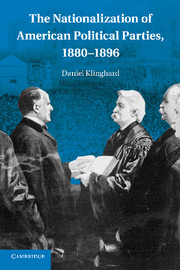Book contents
- Frontmatter
- Contents
- Preface
- Acknowledgments
- Introduction
- 1 Localism and the Jacksonian Mode
- 2 The Nineteenth-Century Associational Explosion and the Challenge to the Jacksonian Mode
- 3 Organizational Transformation and the National Parties
- 4 National Campaign Clubs and the Party-in-the-Electorate
- 5 Grover Cleveland and the Emergence of Presidential Party Leadership
- 6 Party Transformation in the Republican Party
- Conclusion
- Selected Bibliography
- Index
- References
2 - The Nineteenth-Century Associational Explosion and the Challenge to the Jacksonian Mode
Published online by Cambridge University Press: 06 July 2010
- Frontmatter
- Contents
- Preface
- Acknowledgments
- Introduction
- 1 Localism and the Jacksonian Mode
- 2 The Nineteenth-Century Associational Explosion and the Challenge to the Jacksonian Mode
- 3 Organizational Transformation and the National Parties
- 4 National Campaign Clubs and the Party-in-the-Electorate
- 5 Grover Cleveland and the Emergence of Presidential Party Leadership
- 6 Party Transformation in the Republican Party
- Conclusion
- Selected Bibliography
- Index
- References
Summary
In the late nineteenth century, Americans organized themselves into national civic associations at a frenzied pace, especially Americans who felt excluded from the traditional party organizations. As they constructed new national publics, these groups resisted the Jacksonian mode's republican notion of the fundamental coherence of community identities, defending and demonstrating a politics of national aspirations and self-interested policy pursuits. They aggressively challenged the parties' dominance of the political sphere, claiming to offer a more accurate and nimble representation of national public opinion. Impressed by their success at mobilizing national publics, national party leaders transplanted some of the new national associations' methods to the national party organizations, hoping to transfer some of their legitimacy into the parties as well. These associations taught party leaders the potential of national politics and so contributed to a new idea of party, particularly the notion of a nationalized party-in-the-electorate. For this reason, understanding the national party leaderships' adoption of these new methods requires an understanding of their operation in the universe of national citizens' associations.
In the years following the Civil War, American civic associations thrived on the expansion of national communications and travel networks that had occurred during the war, generating a newly nationalized consciousness among many citizens. As Gerald McFarland observes, “Americans regrouped themselves into organizations appropriate for industrial conditions,” as “various occupational groups – farmers, industrial workers, and professional men – heretofore largely unorganized, now formed themselves into national associations.
- Type
- Chapter
- Information
- Publisher: Cambridge University PressPrint publication year: 2010



